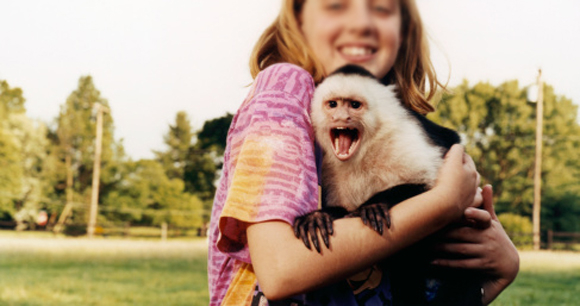
Washington, DC—The Animal Welfare Institute (AWI) endorses today’s reintroduction in Congress of the Captive Primate Safety Act (CPSA), which would end the cruel and dangerous pet primate trade in the United States. Nonhuman primates are highly intelligent and typically social wild animals who can injure or spread disease to the people around them, and whose basic needs cannot be met when kept as pets.
Sponsored by Reps. Earl Blumenauer (D-OR), Brian Fitzpatrick (R-PA), and Sen. Richard Blumenthal (D-CT), this bill would amend the Lacey Act to ban private possession of nonhuman primates. This prohibition is narrowly focused on pet primates and exempts zoos, research labs, sanctuaries, and universities. Current owners would be grandfathered in and simply be required to register their animals to ensure that first responders and animal control officers are aware of the presence of wild animals in their communities. The bill also restricts direct contact between the public and primates.
“Primates are wild animals whose natural behaviors are incompatible with life as a pet in someone’s home,” said Cathy Liss, president of AWI. “Furthermore, during the COVID-19 pandemic, we are witnessing firsthand the devastating consequences of how easily zoonotic disease can spread when humans have close contact with wildlife. Primates can carry communicable diseases that are dangerous and potentially fatal to humans—they do not belong in homes. The Captive Primate Safety Act would protect humans from these unnecessary risks and primates from mistreatment.”
Conservative estimates suggest that there are at least 15,000 primates kept as pets in the United States. About half of all states already prohibit private possession of some or all primate species. Still, a federal law is necessary because primates are easily acquired via the internet or through out-of-state dealers and auctions, and buyers don’t always understand the risks involved or the suffering experienced by captive primates.
In the wild, most primates live in large social groups, but nearly all pet primates are deprived of meaningful contact with other members of their species. Breeders often forcibly remove infants from their mothers soon after birth and sell them to people around the country. Primates quickly mature and express aggression, often prompting owners to remove some or all of the animals’ teeth and consign them to lifelong isolation in cramped cages. Nonhuman primates experience physical and psychological suffering when confronted with unrealistic expectations that they will behave like perfectly trained pets or even "little humans.”
Pet primates also pose a threat to public safety. Even small primates can inflict serious injuries. Since 1990, nearly 300 people have reported being injured by captive primates, although many more incidents likely go unreported. One case that gained worldwide attention occurred in 2009, when a Connecticut woman was blinded and lost most of her face and hands after being attacked by her neighbor’s pet chimpanzee. Additionally, nonhuman primates pose distinct risks to public health since they can easily transmit a wide range of viral, bacterial, parasitic, and fungal diseases to humans.
“Keeping primates as pets is both hazardous and inhumane. There is no reason why these wild animals should be trapped inside homes away from their natural habitats,” said Blumenauer. “Beyond harm to animals, this reckless trend puts families and communities at risk of physical attacks and dangerous viruses. It is past time to end this harmful practice and ensure humane treatment of these animals. It’s what is best for people and primates.”
“As a member of the bipartisan Congressional Animal Protection Caucus, I am committed to ensuring our government is doing its part to promote animal welfare. For too long, primates have been mistreated, exploited, and abused while also carrying deadly diseases that can be passed along to humans,” said Fitzpatrick. “Our bipartisan and bicameral Captive Primate Safety Act would prohibit the unlicensed, private possession of apes, monkeys, and other primates, and put animal welfare and safety first.”
“This common-sense legislation cracks down on the dangerous, exploitative pet primate trade. Prohibiting the private ownership, sale, and transportation of apes, chimps, and other primates will alleviate the suffering these intelligent, social animals endure in substandard captivity,” said Blumenthal. “Hundreds of people have been injured by privately owned primates. Passing the Captive Primate Safety Act will protect both the animals and the public.”
Margie Fishman, (202) 446-2128, [email protected]